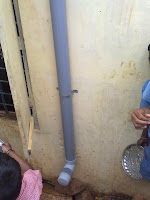An initiative by Samyukth Iyer Sequeira - a grade 6 student studying in the Singapore American School - to facilitate access to water for school children in rural Bangalore, has resulted in the commissioning of a rainwater harvesting system in Govt Primary High School in Bijuwara which is around 55 kms from Bangalore city.
The school has two one storey buildings with roof area around 1250 and 800 sq ft respectively. The village Panchayat supplies water once in around 15 days and this is stored in a sump which is around 4000 litres in capacity. There is also a surface level storage tank which currently is in a state of disuse. The daily water consumption is around 1500 litres which is mainly used for toilet flushing, vessel washing and cooking.
By tapping the rooftop from the two buildings, it is possible to harvest a total of 154 KL of water annually assuming an annual rainfall of 900 mm. The downpipes from the two building would be led to a filtration chamber which is then led to a storage tank.
Some of the work in progress pictures:


The school has two one storey buildings with roof area around 1250 and 800 sq ft respectively. The village Panchayat supplies water once in around 15 days and this is stored in a sump which is around 4000 litres in capacity. There is also a surface level storage tank which currently is in a state of disuse. The daily water consumption is around 1500 litres which is mainly used for toilet flushing, vessel washing and cooking.
By tapping the rooftop from the two buildings, it is possible to harvest a total of 154 KL of water annually assuming an annual rainfall of 900 mm. The downpipes from the two building would be led to a filtration chamber which is then led to a storage tank.
Some of the work in progress pictures:



















